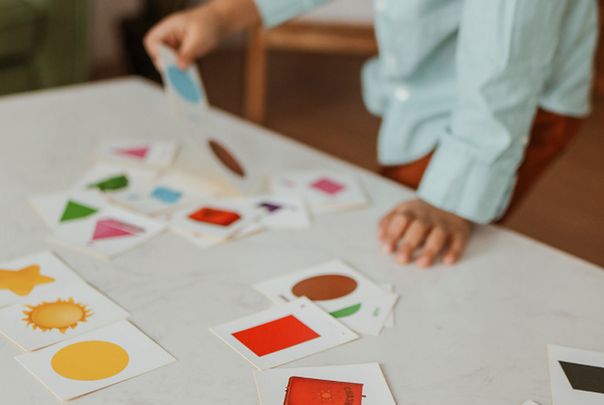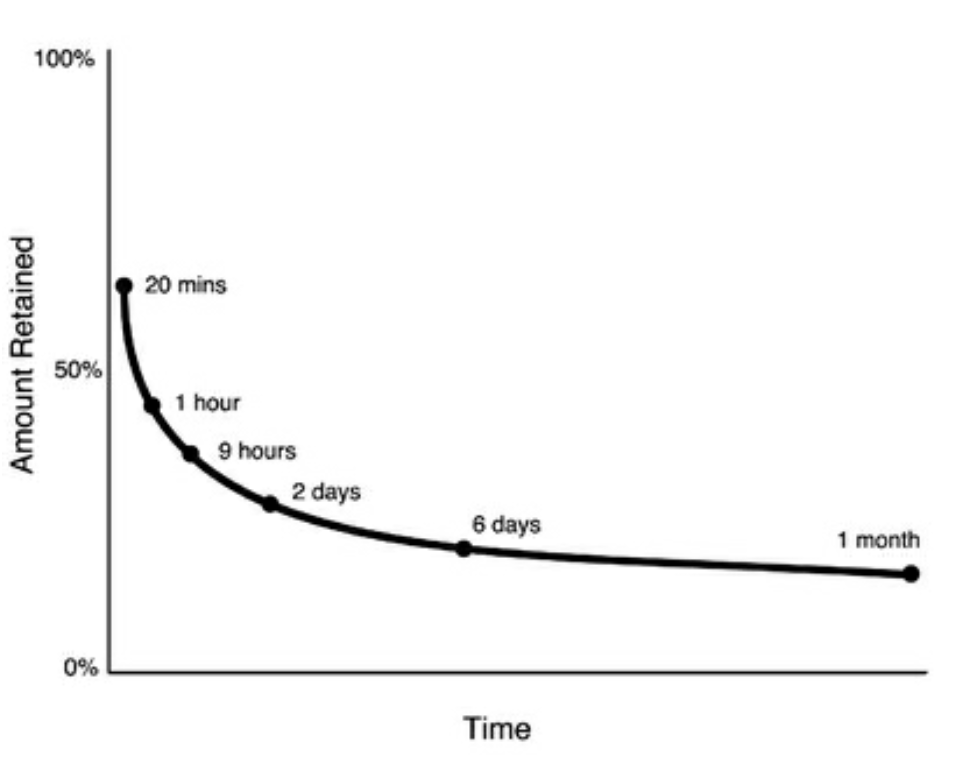|
This article may contain affiliate links. If you choose to purchase, this means I receive a (very) small commission at NO EXTRA COST to you!
You know the feeling well: sometimes you remember things easily, other times it's on the tip of your tongue ... and it drops off a cliff.
Why does it sometimes feel facile, and at other times like your brain is malfunctioning? It's not like you've ever gotten advice on this either. School definitely doesn't help, all they'll tell you is to put more "effort" into it.
As with most things in life, we've been falsely conditioned.
We've been taught that to memorize is like taking a blunt object and trying to repeatedly "hammer" a fact into your mind.
And when this approach doesn't work? They say you're not trying hard enough.
But exerting more effort isn't the solution. What's worse is feeling like you have an inferior memory, that no matter what you won't be one of the "gifted" ones. Look, it's true that some people have a naturally good memory. I've been told mine is pretty abnormal - a question I always get is how did you remember that? That was years ago! Still ... memory is like reading music notes, learning sheet music, or practicing rhythm - it's a skill anyone can improve. They don't understand - it's not the person, it's the method. So if you've ever blamed yourself for having a "bad" memory, please stop - you just haven't been taught how to memorize. Today, I'll show you a foolproof method to memorize any song or piece easily. It's a method I've taught successfully to every single one of my students. And it'll work for you, how does that sound? But before we get to that, first we must dig deeper. It's because memory is not as simple as people make it out to be - it's actually quite the complex topic. Once we deepen your understanding, you'll never see memory the same way again. Here's what we'll cover:
Next, be careful what you wish for. How to Memorize MusicThe Curse of Memory
In the book Moonwalking With Einstein author Joshua Foer shares a story about a Russian journalist named Solomon Veniaminovich Shereshevsky (God that was hard to type).
Let's just call him "S."
He had a major problem. On a typical work day, his boss would blurt out assignments in rapid-fire to S and a roomful of his colleagues. Over time, bossman noticed that S would simply watch and listen - he never took notes. After many days of observing this behavior, he eventually became livid. He took S aside one day and tore into him, berating him to take the job seriously. What happened next was ... incomprehensible. After the boss finished his rant, S calmly proceeded to repeat every single detail of that morning's assignment. Word for word. You see, S's problem was that he could easily memorize anything. I fail to see the problem, you might be thinking. Surely, EVERYONE would kill to have a memory like that! No. They wouldn't. This superhuman feat came at a price, here's how it worked: everything S ever heard had its own color, texture ... even taste. In his own words, sounds evoked a "whole complex of feelings." Some were "smooth and yellow" while others were "orange and sharp as arrows." A voice itself could be "crumbly yellow." This turned out to be a curse: he couldn't think figuratively. Poetry was impossible for him to read, even simple stories were overwhelming (he couldn't stop visualizing). Imagine going to an ice cream shop. The cashier opens his mouth to ask what flavor you want ... and out flows a rainbow of molten lava. This was the price he paid for his stupendous memory. It wasn't that he could remember everything - it's that he couldn't forget. This explains why we can't - and shouldn't want to - remember everything. The true nature of memories are that they're supposed to decay over time. So the next time you get frustrated because you can't remember what you just studied, realize it's only natural. Next: a detailed look at the process of forgetting.  How Forgetting Works
Hermann Ebbinghaus, a German psychologist, set out to understand the process of why we forget.
He spent years(!) memorizing 2,300 three-letter nonsense syllables - think GUF, LER, NOK - over varying periods of time to see what and how he forgot. Thanks to his masochistic research, we have one of the most famous images regarding memory - the "forgetting" curve:
No matter what he did, the results were the same:
For regular folks, they forgot 90% of what they studied within 3 days ... the majority of this happened within the first few hours after class or study sessions were over. From this we can conclude the brain isn't some machine with infinite storage. To err is to be human and to be human is to forget. Instead of thinking of forgetting as a flaw, realize it's actually a built-in feature. Next: the types of memory. Types of Memory
According to John Medina - author of Brain Rules - we have 2 types of memory:
Additionally, memory is short-term or long-term.
Now, whether something is memorized depends on two things: Automatic vs. Effortful processing. Automatic processing takes minimal effort - you're able to easily recall a physical location with lots of information (what came before and after). An example would be a memorable, meaningful experience such as your first kiss or the best birthday you ever had. This also explains why traumatic experiences are so hard to erase - but let's keep things positive here. On the other hand, effortful processing requires deliberate, conscious and energy- burning labor - like trying to remember your pin code or password to access your online bank account. So understanding what (information vs. procedure) you need to memorize can affect how (automatic vs. effortful) you do it. Side note: the tactics I'll show you later have more to do with memorizing repertoire. If you want to memorize "skills" - like reading sheet music or learning technique (scales, etc.) - then the traditional approach probably works better (rote learning). These types of skills require drilling (rep after rep), though there's still a smart way to go about this - perhaps I'll cover this in a future blog post. Next, concepts that teach you how to remember. How to Remember
Here's an iron rule to follow in order to make memorization as easy as possible: encode whatever you memorize as richly as you can.
Remember that "S" was able to memorize everything easily thanks to the elaborate, and baffling, images he created. We'll use that principle to harness some of that power for our benefit.
One way to do this is with vision - our strongest sense. In this blog post I mentioned a study in which wine experts from the University of Bordeaux failed to tell that the red wine they were drinking was actually white wine (dyed red). Even for these oenophiles - Bordeaux! - what they saw overrode all of their other senses. Since vision also takes up about half of the brain's processes, it's safe to say we learn better with images: in Brain Rules, tests that showed people could remember 2,500 pictures with at least 90% accuracy several days later! And this is how "memory athletes" are able to ingrain hundreds of sets of random numbers and letters by heart. For example, the number 8 could represent infinity. The number 2 resembles a swan. Thus, an image for 82 - infinite swans. So the next time you memorize repertoire, you might try visualizing a story. A great piece to try this on is Schumann's "Carnival" - every movement represents a scene or character. However, vision isn't the only way to memorize. A second method is retrieval. From the book Ultralearning, by Scott Young, an example of this is known as free recall. Imagine reading or viewing information, then immediately taking out a blank sheet of paper to write down everything you can remember. It's like elaborate coding, but the main reason it works is due to cognitive strain. This is related to effortful processing (mentioned earlier) and explains why most people will avoid this tactic - it feels horrible. But remember, difficulty is actually a reliable indicator: if it feels challenging, then you're doing it the right way. Lastly, chunking is an additional concept to aid memory - I use this in piano lessons all the time. Foer describes chunking as "a way to decrease the number of items you have to remember by increasing the size of each item." So HEADSHOULDERSKNEETOES becomes HEAD, SHOULDER, KNEES, TOES. ​Another example is the phone number (area code, 3 digits, then 4): 1234567890 = (123) 456-7890. This is also how chess grandmasters recall a seemingly infinite amount of moves: they chunk actions or strategies into sets they can use during games. However, when pieces are randomly ordered - instead of placed according to the "rules" of chess - the grandmasters' memories become no different than an amateur's. Why? Because chunking only works in context.
SF participant in memory experiments (no relation to S), memorized random numbers this way. When he saw 3,492 he translated this into 3 minutes, 49 point 2 seconds.
Since he was an avid runner, this worked because it represented a near world-record mile time (context). So when you chunk your music, remember that to engrain it into your memory as permanently as possible, it must be meaningful for you - whatever that entails (it's different for everyone). Now ... time to show you how to not forget.  How to Not Forget
Spaced repetition is my most reliable, consistent method to memorize anything - and it also works for all of my students (any age, any level).
It's based on this principle: you'll remember something if you're told 3 times in a row, but you'll remember it much longer when told in ten-minute intervals. This works because spaced repetition is like retrieval: it depends on cognitive strain. If you tried re-memorizing something within a few seconds or even a few minutes later, it's a lot easier than trying to recall that fact 30 minutes or an hour later. Ironically, people discount this strategy because it feels difficult. They'll stick with the more familiar method even if it's not effective - since it's more comfortable to them. But you know better by now. This is yet another nail in the coffin for the traditional school approach: rote repetition doesn't work because you not only short-circuit the natural process of forgetting, but also completely bypass mental effort. By the way, I'll show you how I combine spaced repetition with chunking in the next section. Now, suggestions on how to use spaced repetition. You can practice within a session or over the span of a longer period of time. For example, try memorizing at the beginning of your session. Do it again in 10 minutes and one last time 20 minutes later. Over the course of a week try memorizing on Monday, again on Tuesday and then a few days later on Friday. You can get to the point where you only need to practice memorization once a month or even once a year. One caveat: lengthen the period of waiting time when it's easy and shorten it when it's difficult. You can also easily move memories from short-term to long-term. It's a simple procedure:
Play a chunk of music from whatever you're practicing then immediately cover up your sheet music and play it again - this is step 1 (with sheet music, without). When you do this enough times - and "space" your sessions out - it becomes a long- term memory. How do you know when this happens? You'll know this is the case when you're able to recall each chunk from memory without the sheet music. Here's how I do this in piano lessons:
The student might literally only see a flashcard with the letter C. He or she will then have to try and recall that section from memory and play it on the piano. If this sounds difficult to you, it is. But only at first - once they get more practice they're able to pull off this feat on a regular basis. But don't forget, even if you can successfully play from memory you must play it again with the sheet music (step 2: without sheet music, with). DO NOT SKIP THIS STEP. This is because you always need to verify what you've memorized. If you don't do this you run the risk of altering what you remember over time. The danger in not doublechecking your work is you might be playing something entirely different months later without even realizing it. There's nothing worse than not knowing what you don't know. Auto-Memory
Now let me show you how to use Anki to put memorization on auto-pilot.
Chunk sections on 2 levels:
Macro represents the largest sections. For a story this would obviously be the beginning, middle and end. This is similar to a sonata - exposition, development, and recapitulation. Of course, every piece is different. But once you figure out the macro sections, label them with a letter. Sonata:
Then take each macro section and divide further into micro sections:
Once you've divided up all the sections, open up Anki and create "decks" at 3 levels:
Each chunk becomes a "card" for the appropriate deck (micro, macro, repertoire). Once you input each card, memorization is thoroughly taken care of since you've accounted for every level (bottom-up).
This is your foolproof, repeatable method for memorizing anything - check out this video for a live demonstration. Time to Say Goodbye
I used to believe memory was just like most things in life: to be conquered through brute force. But as I got older, I realized there was a ceiling to the effort I put in.
You can't solve everything through exertion alone, trying harder doesn't always work. Yet you can develop a strong(er) memory through correct practice and strategy - by working smarter, not harder.
And now you have the roadmap to do so, a process that can be replicated and used by anyone.
But it ain't easy, it'll take a few review sessions to fully understand the concepts you've learned today to put them into action.
And that's the point - if it was easy than anyone could do it. Take the road less traveled. Spending more time than necessary is just silly, don't put yourself through unnecessary difficulty. It's not just about looking cool - effort only matters if it leads to measurable results. I'll leave you with an important question, one that led me to develop this process: is there a better way to do this? This question helped me not only solve the problem of memorization, but develop countless frameworks to make my life easier. It's a powerful question because it taps into your curiosity, and curiosity is the superpower that can change your life. Remember to add a dash of imagination and you can overcome any challenge.
Hope this helped and happy practicing!
Did you enjoy reading this today?

Your donation helps me create free content. Every dollar goes a long way! =)
2 Comments
Chalky
8/9/2023 03:18:57 pm
👍
Reply
Warren
8/9/2023 10:36:52 pm
Thanks for reading m8!
Reply
Leave a Reply. |
Categories
All
|






